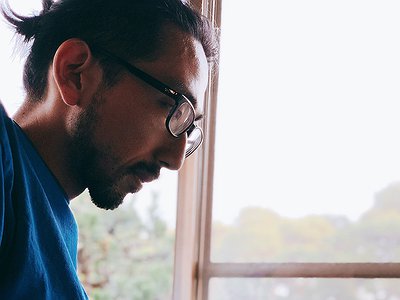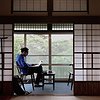Collaborations can take on many forms. What role do they play in your approach and what are your preferred ways of engaging with other creatives through, for example, file sharing, jamming or just talking about ideas?
By collaborating with someone, I can reaffirm the importance of being involved with others. I can reaffirm the obvious: that someone else's sensibility inspires my own, and expands my world. And I would like to share that feeling with everyone once again.
For example, that people on opposite sides of the globe, Japan and Argentina, can create something together in the comfort of their own homes, is only possible in this day and age. I collaborated with Plasma Rüby who is my musically best friend. He and I exchanged files on the Internet, and we added each other's ideas to the song to finish it.
When I collaborate with someone, I already trust their abilities, so I don't make a special effort to harmonize our views. Even if I collaborate with someone I don't know, I get to know them through making music together. It’s like a jam session. More than anything, it’s fun, like we're on an adventure together to discover the unknown.
Take us through a day in your life, from a possible morning routine through to your work, please. Do you have a fixed schedule? How do music and other aspects of your life feed back into each other - do you separate them or instead try to make them blend seamlessly?
Of course, I try to make my music and my life blend seamlessly. However, while I was working on the album, my life naturally became more organized, although I wasn't aware of it.
I woke up at 8:00 a.m. and started working on my ideas for the day around 9:00 a.m. I had lunch at 1:00 p.m., then watched an hour's worth of dramas or the first half of a film with my wife, and at 3:00 p.m. reviewed the work I did in the morning. I'd finish working at 6pm, did some light exercise, played video games at 7pm, had dinner at 8pm, watched another drama or the 2nd half of the film or something, read a book, and went to bed at midnight.
When I go through a repetitive routine, I am aware of minute changes in my daily life. I feel like I can be aware of minute changes in the world. It was a very good situation for me to express my life through music.
Can you talk about a breakthrough work, event or performance in your career? Why does it feel special to you? When, why and how did you start working on it, what were some of the motivations and ideas behind it?
My creativity experienced a breakthrough when I got the koto instrument, and after the release of the song "Rei-Row", my career has been a series of big turning points.
The biggest turning point was being selected as a participant for the Red Bull Music Academy 2014 Tokyo. The number of applicants that year was the highest ever, and out of 6,000 applicants from all over the world, a total of juzst 60 participants were selected, 30 each for the first and second semesters. That's only 1%.
I hadn't had the chance to meet musicians from overseas before, and now I was going to meet 30 musicians, each with a different background, and career, all from different countries. Then I understood my identity, realized that I could communicate through music even if I couldn't speak their language, and realized that my music had a solid originality.
My motivation for applying was simple: I had just started my solo career and wanted to know if my music was worthy of being recognized by someone in the world.
There are many descriptions of the ideal state of mind for being creative. What is it like for you? What supports this ideal state of mind and what are distractions? Are there strategies to enter into this state more easily?
The most important thing is to just start working without thinking about whether or not I’m in an ideal state for creative work.
I'm lazy. So if I waited for the motivation to come, the day would be over. And even if I was not motivated in the beginning, I’d gradually become more focused as I continued. Even on days when I didn't have the motivation, I kept making at least eight bars every day. And even if I was busy, tired, uncomfortable, or just couldn't work some days for whatever reason, I just tried to keep my mind creative every day.
In other words, it’s like freediving into the sea like Jacques Mayol. As I continue, I gradually become more and more focused. Gradually, the sounds around me disappear, and I find myself in a state of mindlessness. Maybe it could be called a Zen state of mind. Then, when I can't hold my breath anymore, I come back to reality.
Music and sounds can heal, but they can also hurt. Do you personally have experiences with either or both of these? Where do you personally see the biggest need and potential for music as a tool for healing?
In my opinion, the greatest appeal of music today is that it is a form of entertainment that consumes the same amount of time for all people. This is neither a conceptual point of view nor a metaphor. What I mean is this: The time we spend enjoying entertainment in the modern world is beginning to be compressed and streamlined.
Limited 140 characters texts, images that are interesting the moment you see them are valued, and 15-second funny videos are fun. Eventually, you can even watch movies at twice the speed. Music will be left behind in this. Music cannot be streamlined in terms of time. In this sense, the act of enjoying music may become a very luxurious entertainment in the future.
In other words, all people are equal in terms of time when it comes to enjoying music. Regardless of race, gender, country, background, current, situation, everything … people will spend the same amount of time. They can then share their experiences, talk about their thoughts, and connect with society. It is this experience that will be the greatest healing in the future, I think.
There is a fine line between cultural exchange and appropriation. What are your thoughts on the limits of copying, using cultural signs and symbols and the cultural/social/gender specificity of art?
Cultural exchange is very important for human progress. However, when we are attracted to a new culture, it is important to deeply study its background and history. And to understand them. In addition, we need to compare these to our own. We need to find something in common between this other culture and our own, or something we need or lack in our own culture.
Whether subjective or objective, it is important to find a reason, understanding and love in it. Don't treat it as just an interest. Art and culture shouldn't be treated like you would importing and exporting industrial materials. Knowing the other person's sensitivity and understanding them, with respect and love. That is the meaning of cultural exchange. This is true for us all, regardless of our culture, social role or gender.
However, I welcome the fact that Japanese culture is becoming more and more known to the world. As was in the news the other day, the concept of Kawaii can be performed by people worldwide. Japanese people also appreciate the fact that their culture is improved by the cultures of other countries. This may be because our own culture is protected by the fact that we are a small island nation across the sea.
Our sense of hearing shares intriguing connections to other senses. From your experience, what are some of the most inspiring overlaps between different senses - and what do they tell us about the way our senses work?
Usually, when I listen to music, I can feel colors. Red music, turquoise, blue music, light purple music, and so on. When I feel those colors, I can do something to color the space, like changing the wallpaper in a room. Also, sometimes I can feel the shape of the sound.
When I went to an Autechre gig and listened to their sound in a dark club, I could feel the sound particles flying out of the speakers like cubes and spheres. In addition, the Japanese language has so many onomatopoeic words that can be used to verbalize many subtle senses. I think that expressing one sense with another like that is very useful for describing and sharing something formless like a sensibility or a concept.
By feeling it from a different angle, we can feel it more concretely and explain it. The more sensory vocabulary we have, the better. I often get ideas from visual inspirations, and try to express them with sound.
Art can be a purpose in its own right, but it can also directly feed back into everyday life, take on a social and political role and lead to more engagement. Can you describe your approach to art and being an artist?
Today, I think it’s our job as artists to expand the diversity of the world. It's like planting seeds of diversity in the world. Letting different kinds of flowers bloom to show people that there are multiple ways of thinking, expressing yourself, and living, and to promote mutual understanding.
The key is to keep creating new value, whether it is personal or appealing to society. We are needing more pages in our encyclopedia. Pursuing originality, without fear of genre classification and categorized by someone else, supports this aim, I think.
What can music express about life and death which words alone may not?
It's one of the major themes for musicians. For a long time, a lot of musicians have been trying to express it. I’m also doing it.
16 years ago, when I was 23 years old, my mother passed away. Since then, I have been very conscious about life and death. It's always somewhere in my head.
I have written many songs dedicated to my mother, and I would like to continue to do so. Even if someone tells me I can't make it, I will keep trying.



